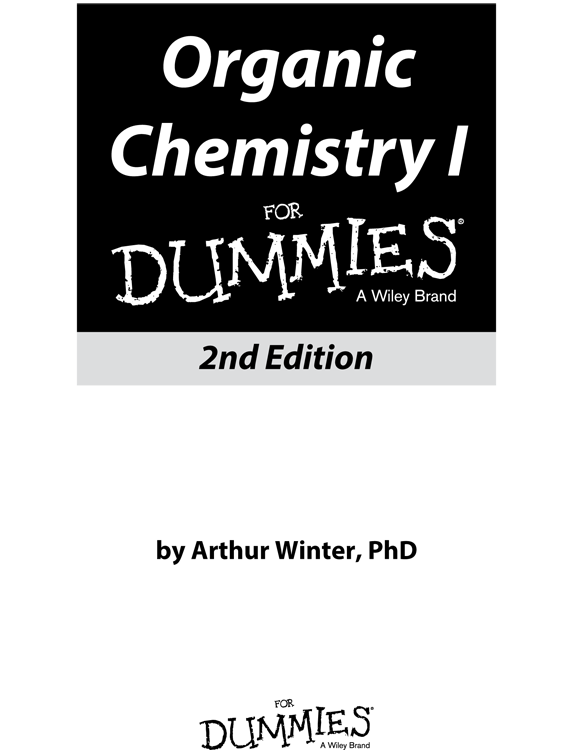
Organic Chemistry I For Dummies, 2nd Edition
Published by: John Wiley & Sons, Inc., 111 River Street, Hoboken, NJ 07030-5774, www.wiley.com
Copyright 2014 by John Wiley & Sons, Inc., Hoboken, New Jersey
Published simultaneously in Canada
No part of this publication may be reproduced, stored in a retrieval system or transmitted in any form or by any means, electronic, mechanical, photocopying, recording, scanning or otherwise, except as permitted under Sections 107 or 108 of the 1976 United States Copyright Act, without the prior written permission of the Publisher. Requests to the Publisher for permission should be addressed to the Permissions Department, John Wiley & Sons, Inc., 111 River Street, Hoboken, NJ 07030, (201) 748-6011, fax (201) 748-6008, or online at http://www.wiley.com/go/permissions .
Trademarks: Wiley, For Dummies, the Dummies Man logo, Dummies.com, Making Everything Easier, and related trade dress are trademarks or registered trademarks of John Wiley & Sons, Inc., and may not be used without written permission. All other trademarks are the property of their respective owners. John Wiley & Sons, Inc., is not associated with any product or vendor mentioned in this book.
LIMIT OF LIABILITY/DISCLAIMER OF WARRANTY: WHILE THE PUBLISHER AND AUTHOR HAVE USED THEIR BEST EFFORTS IN PREPARING THIS BOOK, THEY MAKE NO REPRESENTATIONS OR WARRANTIES WITH RESPECT TO THE ACCURACY OR COMPLETENESS OF THE CONTENTS OF THIS BOOK AND SPECIFICALLY DISCLAIM ANY IMPLIED WARRANTIES OF MERCHANTABILITY OR FITNESS FOR A PARTICULAR PURPOSE. NO WARRANTY MAY BE CREATED OR EXTENDED BY SALES REPRESENTATIVES OR WRITTEN SALES MATERIALS. THE ADVISE AND STRATEGIES CONTAINED HEREIN MAY NOT BE SUITABLE FOR YOUR SITUATION. YOU SHOULD CONSULT WITH A PROFESSIONAL WHERE APPROPRIATE. NEITHER THE PUBLISHER NOR THE AUTHOR SHALL BE LIABLE FOR DAMAGES ARISING HEREFROM.
For general information on our other products and services, please contact our Customer Care Department within the U.S. at 877-762-2974, outside the U.S. at 317-572-3993, or fax 317-572-4002. For technical support, please visit www.wiley.com/techsupport .
Wiley publishes in a variety of print and electronic formats and by print-on-demand. Some material included with standard print versions of this book may not be included in e-books or in print-on-demand. If this book refers to media such as a CD or DVD that is not included in the version you purchased, you may download this material at http://booksupport.wiley.com . For more information about Wiley products, visit www.wiley.com .
Library of Congress Control Number: 2013954080
ISBN 978-1-118-82807-6 (pbk); ISBN 978-1-118-82796-3 (ebk); ISBN 978-1-118-82813-7 (ebk)
Manufactured in the United States of America
10 9 8 7 6 5 4 3 2 1
Chapter 1
The Wonderful World of Organic Chemistry
In This Chapter
 Coping with pre-organic anxiety
Coping with pre-organic anxiety
 Defining organic chemistry
Defining organic chemistry
 Breaking down the mysteries of carbon
Breaking down the mysteries of carbon
 Seeing what organic chemists do
Seeing what organic chemists do
Organic chemistry is a tyrant youve heard about a lot. Youve heard your acquaintances whisper about it in secret. Its mean, they say; its brutish and impossibly difficult; its unpleasant to be around (and smells sort of funny). This is the chapter where I introduce you to organic chemistry, and where, I hope, you decide to forget about the negative comments youve heard about the subject.
In this chapter, I show you that the nasty rumors about organic chemistry are (mostly) untrue. I also talk about what organic chemistry is, and why you should spend precious hours of your life studying it. I show you that discovering organic chemistry really is a worthwhile and enjoyable expedition. And the journey is not all uphill, either.
Shaking Hands with Organic Chemistry
Although organic is a very important and valuable subject, and for some its even a highly enjoyable subject, I realize that organic chemistry is intimidating, especially when you first approach it. Perhaps youve already had what many old-timers refer to simply as The Experience, the one where you picked up the textbook for the first time. This is the time when you heaved the book off the shelf in the bookstore. When you strained your back trying to hold it aloft. When you felt The Dread creep down your spine as you scanned through the books seemingly infinite number of pages and feared that, not only would you have to read all of it, but that reading it wouldnt be exactly like breezing through a Hardy Boys adventure or a Nancy Drew mystery.
No doubt, the material appeared strange. Opening to a page halfway through the book you saw bizarre chemical structures littering the page, curved arrows swooshing here and there like flocks of starlings, and data tables bulging with an inordinate number of values values that you suspect you might be required to memorize. I admit that organic chemistry is a little frightening.
I think most students feel this way before they take this class, and probably even your professor did, as did her professor before her. So youre not alone. But you can take comfort in knowing that organic chemistry is not as hard as it looks. Those who put in the required amount of work which, admittedly, is a lot and dont fall behind, almost always do well. More than almost any other subject, organic chemistry rewards the hard workers (like you), and relentlessly punishes the slothful (the others in your class). I think understanding organic chemistry is not so much hard as it is hard work.
 I hope all this talk about how intimidating the course is hasnt put a damper on your enthusiasm, because the subject of organic chemistry really is a doozy. To learn about organic chemistry is to learn about life itself, because living organisms are composed of organic molecules and use organic molecules to function. Swarms of organic molecules are at work in your body fueling your brain, helping your neurons fire, and getting the muscles in your mouth to clench open and shut and thats just a small sampling of the organic molecules needed in order for you to complain about your schools chemistry requirements.
I hope all this talk about how intimidating the course is hasnt put a damper on your enthusiasm, because the subject of organic chemistry really is a doozy. To learn about organic chemistry is to learn about life itself, because living organisms are composed of organic molecules and use organic molecules to function. Swarms of organic molecules are at work in your body fueling your brain, helping your neurons fire, and getting the muscles in your mouth to clench open and shut and thats just a small sampling of the organic molecules needed in order for you to complain about your schools chemistry requirements.
Humans, in fact, are composed almost entirely of organic molecules (all the soft parts anyway), from our muscles, hair, and organs, to the fats that cushion our bellies and keep us toasty warm during sweltering summer nights (some people are more richly blessed in this regard than others). Organic molecules can also range in size from the very tiny, like the carbon dioxide you exhale that consists of only three atoms, to the staggeringly large, like DNA, which acts as your molecular instruction manual and is made up of millions of atoms.
The soap opera of organic molecules
Organic molecules govern our life processes like metabolism, genetic coding, and energy storage. In nature, organic molecules also play out a crazy soap opera, acting as the medium for many twists and turns, deceptions, betrayals, strategic alliances, romances, and even warfare.
Take plants, for example. They seem so defenseless. When a predator comes to lunch on a plants leaves, the plant cant just pack up its bags and take off. Its stuck where it is, so theres nothing it can do, right? But although plants may seem defenseless, theyre not. Many plants produce antifeedants , nasty organic compounds that are unpleasant tasting or even toxic to those who would dare eat them. (As a kid, I always knew Brussels sprouts contained something like this.) Predators that have feasted on a plant rich in these unpleasant compounds make sure to refrain from eating them in the future.

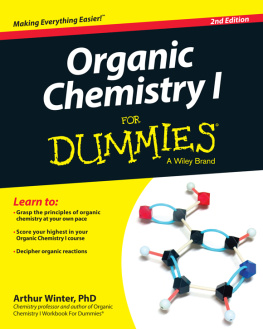



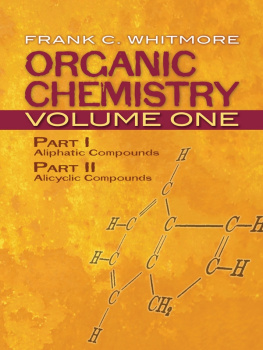
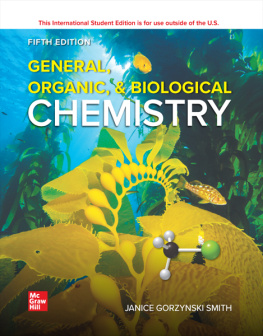
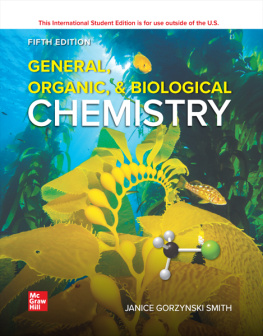
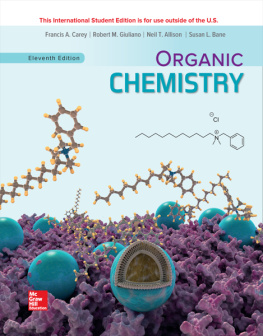


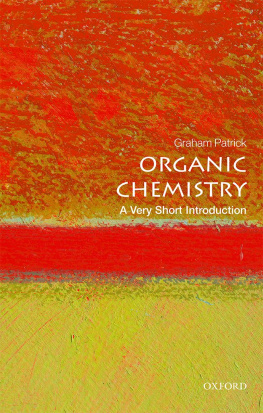
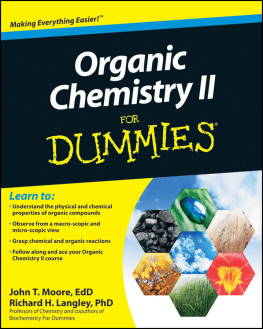
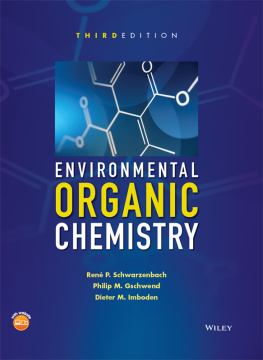
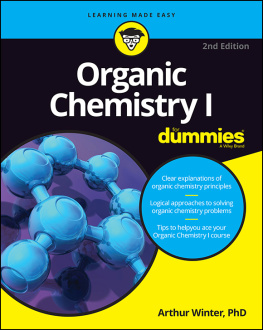

 Coping with pre-organic anxiety
Coping with pre-organic anxiety I hope all this talk about how intimidating the course is hasnt put a damper on your enthusiasm, because the subject of organic chemistry really is a doozy. To learn about organic chemistry is to learn about life itself, because living organisms are composed of organic molecules and use organic molecules to function. Swarms of organic molecules are at work in your body fueling your brain, helping your neurons fire, and getting the muscles in your mouth to clench open and shut and thats just a small sampling of the organic molecules needed in order for you to complain about your schools chemistry requirements.
I hope all this talk about how intimidating the course is hasnt put a damper on your enthusiasm, because the subject of organic chemistry really is a doozy. To learn about organic chemistry is to learn about life itself, because living organisms are composed of organic molecules and use organic molecules to function. Swarms of organic molecules are at work in your body fueling your brain, helping your neurons fire, and getting the muscles in your mouth to clench open and shut and thats just a small sampling of the organic molecules needed in order for you to complain about your schools chemistry requirements.